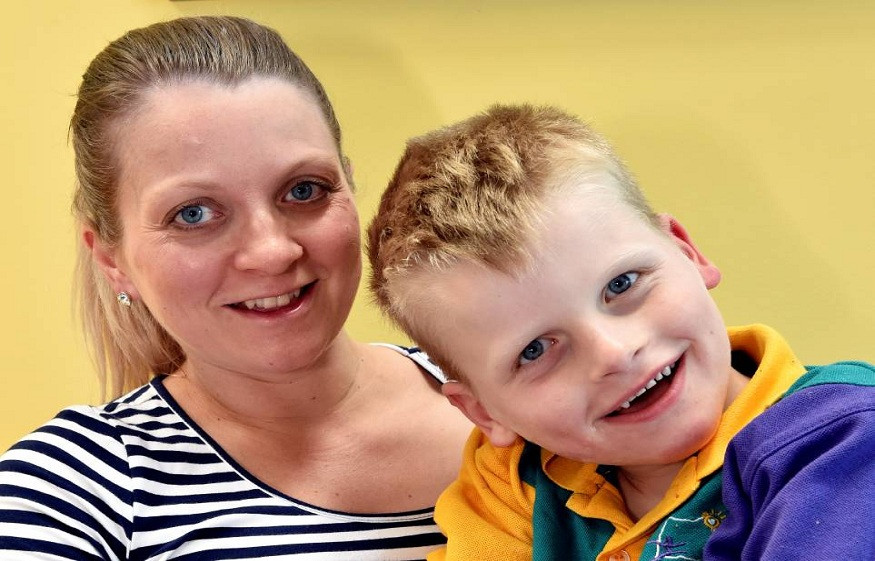Bruce Springsteen and his wife, Patti Scialfa, gave fans an inspiring and emotional performance on the Jersey Shore Sunday.
The legendary rocker, 74, and his longtime E Street Band member and wife, 71, performed a tear-jerking duet at the Sea.Hear.Now musical festival in Springsteen’s hometown of Asbury Park. The couple sang Springsteen’s 1987 song “Tougher Than The Rest,” a poignant choice given Scialfa’s recent blood cancer reveal.
In a new documentary about the Boss and his band, “Road Diary: Bruce Springsteen and the E Street Band,” Scialfa shared that she has been battling multiple myeloma since 2018.
A type of blood cancer, “multiple myeloma forms in a type of white blood cell called a plasma cell,” according to the Mayo Clinic. “Healthy plasma cells help fight infections by making proteins called antibodies. Antibodies find and attack germs. In multiple myeloma, cancerous plasma cells build up in bone marrow.”
“Touring has become a challenge for me,” Scialfa said in the film, which premiered Sept. 8 at the Toronto International Film Festival.
“This [disease] affects my immune system, so I have to be careful what I choose to do and where I choose to go. Every once in a while, I come to a show or two and I can sing a few songs onstage, and that’s been a treat,” she added.
Her performance Sunday was one of those treats — for her, but also for Springsteen and the crowd.
“We got my beautiful wife, Patti Scialfa, is with us!” Springsteen said, welcoming her onstage. Scialfa was all smiles as she joined her husband. The pair got up close and personal, sharing a mike and swaying with one another during their emotional rendition of “Tougher Than The Rest.”
Springsteen and Scialfa embraced at the end of the song to applause from the crowd before she left the stage.
Scialfa’s current condition is not known. She did not attend the premiere of “Road Diary” at TIFF, making her performance at the Sea.Hear.Now festival all the more significant.
Springsteen headlined the two-night event six years after he made a surprise appearance alongside Social Distortion at the first Sea.Hear.Now festival. Fans were astonished when he was announced as the leader of the festival’s lineup in March, prompting tickets to sell out almost immediately.
Patti Scialfa, wife of Bruce Springsteen and a member of the E Street Band, has announced a diagnosis with blood cancer.
Speaking in a new film, Road Diary: Bruce Springsteen and the E Street Band, Scialfa says she was diagnosed with multiple myeloma in 2018, during the acclaimed Springsteen on Broadway concert residency.
She reflects on her illness in the film, which documents Springsteen and the E Street Band’s ongoing world tour, saying: “It felt so good to be back on stage. Touring has become a challenge for me … [The illness] affects my immune system so I just have to be careful what I choose to do and where I choose to go. Every once in a while, I come to a show or two and I can sing a few songs on stage, and that’s been a treat. That’s the new normal for me right now, and I’m OK with that.”
Scialfa joined the E Street Band in 1984, bringing backing vocals to the Born in the USA tour, and began a romantic relationship with Springsteen later that decade, following his divorce from first wife Julianne Phillips. Their creative partnership has endured, and they have had three children: Evan, Jessica and Samuel.
Springsteen has had his own health issues to contend with during the world tour, his first with the E Street Band since 2017. In September 2023 he postponed the remainder of that year’s dates while he had treatment for peptic ulcer disease, and in May this year he postponed four more due to “vocal issues” and subsequent advice from doctors.
The tour has been critically acclaimed, with the Guardian’s Alexis Petridis writing of the first UK date in May 2023: “They invariably give off the air of people who are there because they desperately want to be there, a bar band that can’t quite believe their luck to be playing a stadium, despite the fact that they’ve been playing stadiums since the early 80s.”
Road Diary: Bruce Springsteen and the E Street Band has premiered at the Toronto film festival, and will air on Hulu and Disney+ from 25 October.
In the new documentary “Road Diary: Bruce Springsteen and the E Street Band,” Scialfa says that she was diagnosed in 2018, according to Variety, which was first to report the news. She has struggled to perform because of the illness, she says.
“This affects my immune system, so I have to be careful what I choose to do and where I choose to go,” Scialfa, 71, says in the documentary, according to Variety. “Every once in a while, I come to a show or two and I can sing a few songs on stage, and that’s been a treat.”
The film premiered Sunday at the Toronto Film Festival. Scialfa has been mostly absent from the E Street Band’s current tour.
Patti Scialfa, Bruce Springsteen’s wife and bandmate, recently revealed she was diagnosed in 2018 with a rare blood cancer called multiple myeloma.
The 71-year-old has sung and strummed alongside Bruce Springsteen as a backup vocalist and guitarist for over four decades. Since joining the E Street Band in 1984, Scialfa helped create hits like “Dancing in the Dark” and “Born in the U.S.A.,” which shaped music of that era and earned the group a place in the 2014 Rock & Roll Hall of Fame. Though the E Street band is still active today, these days Scialfa is notably absent from the lineup.
Scialfa has pulled back from touring since her myeloma diagnosis. She shares her story in the documentary Road Diary: Bruce Springsteen and the E Street Band, which premiered at the Toronto Film Festival. Multiple myeloma “affects my immune system, so I have to be careful what I choose to do and where I choose to go,” she explains in the film. “Every once in a while, I come to a show or two and I can sing a few songs on stage, and that’s been a treat. That’s the new normal for me right now, and I’m OK with that.”
Patti Scialfa’s cancer diagnosis has taken her off the stage and imposed new limits on her body. But what exactly is multiple myeloma, and how does it impact one’s life?
Understanding Multiple Myeloma
Multiple myeloma is a blood cancer that impacts plasma B cells, a type of white blood cell found in the bone marrow. Plasma cells usually protect the immune system by producing antibodies. However, for people with myeloma, these plasma cells no longer keep the body safe; they produce abnormal, damaging antibodies and multiply faster than the body can handle. They crowd out healthy red blood cells and harm multiple bones throughout the body, including the spine, pelvis and ribs—thus the name “multiple” myeloma. The cancer cells can also spread beyond the bone marrow to other organs.
Just as Scialfa states in the documentary, multiple myeloma affects the immune system. It may not be noticeable at first since most people are initially asymptomatic. As the cancer increasingly sets the body off-balance, a wide range of symptoms can emerge:
- Bone pain: A dull ache in the back, ribs or hips is a common symptom.
- Fatigue: A persistent feeling of tiredness and weakness.
- Weakness in arms and legs: This can be a sign of nerve damage due to the cancer spreading to the spine.
- Numbness in arms and legs: This can be a sign of nerve damage due to the cancer spreading to the spine.
- Frequent infections: Weakened immune systems are more susceptible to recurring infections like pneumonia, urinary tract infections and skin infections.
- High calcium levels: This can lead to kidney stones, nausea, constipation and mental confusion.
- Anemia: A shortage of red blood cells, which can cause fatigue, shortness of breath and pale skin.
- Kidney problems: The cancer can damage the kidneys, leading to fluid retention, swelling in the legs and ankles, and reduced urine output.
- Bone fractures: Bones weakened by the cancer may become more fragile and prone to fractures, even from minor bumps or falls.
Most people only discover they have myeloma after symptoms have persisted for some time or after routine blood tests.
More than 35,000 people in the U.S. will be diagnosed with multiple myeloma this year. It’s rare — less than 1% of men and women will develop this illness at some point in their life — but certain risk factors increase this likelihood, such as excess weight, African American descent, a family history of multiple myeloma and older age, with the average age of diagnosis at around 65 years old.
Treatment Options for Multiple Myeloma
What treatments would someone like Scialfa undergo to treat their myeloma?
Options vary depending on how severe the disease is and if they are eligible for an autologous stem cell transplant. A transplant can benefit patients significantly by renewing the bone marrow's ability to produce healthy blood cells. For this procedure, a patient’s blood stem cells are taken and stored until after treatment to kill cancer cells. Then, the cells are infused back into the bloodstream through an IV.
Most patients — transplant candidates or not — begin a triple-drug combination treatment that includes:
- Proteasome inhibitors: These drugs target the proteasome, which is a cellular mechanism that breaks down proteins. By interfering with the proteasome, these drugs can kill cancer cells and slow the growth of multiple myeloma.
- Immunomodulatory drugs: These drugs help the immune system fight myeloma cells. One of these drugs, thalidomide, was originally known for its effect on morning sickness during pregnancy but was later found to have anti-cancer properties.
- Chemotherapy drugs: These drugs can kill cancer cells and slow the growth of myeloma.
After patients undergo several rounds of this regime, they transition to a less intense treatment to prevent the cancer from returning.
If the patient is not eligible for a transplant or has more aggressive cancer, they may undergo the triple treatment for an extended period or take additional anti-cancer drugs like monoclonal antibodies or chemotherapy.
Relapse and CAR T Therapy
Relapse is a significant concern. Once myeloma returns, previous treatments become less effective at keeping the cancer at bay. For these cases, it may be appropriate to consider a novel immunotherapy called Chimeric Antigen Receptor T Cell Therapy or CAR T therapy.
CAR T therapy is an innovative cell therapy approved to treat myeloma in 2022 and 2024. This breakthrough takes a patient’s white blood T cells, transforms them with gene editing, and reinfuses them into the patient. The edited immune cells have a heightened ability to detect and wipe out cancerous cells and may offer long-lasting protection when other treatments no longer have any impact. According to clinical trial results, 73% to 98% of relapsed myeloma patients respond to CAR T therapy, depending on the product — a beacon of hope for those with few options. Although the FDA is investigating whether CAR T therapies can, in rare instances, cause secondary cancer in patients, the benefits will likely outweigh this potential adverse effect for most people.
Improving Outcomes with New Treatments
Introducing novel treatments such as proteasome inhibitors, immunomodulating drugs, monoclonal antibodies and CAR T therapy has improved prognoses for myeloma. As shown in Figure 1, the five-year survival rate has increased over the years; today, more myeloma patients than ever are alive five or more years after receiving their diagnosis/starting treatment.
Multiple myeloma treatments will likely continue to improve, especially in the realm of CAR T therapy. Researchers are investigating ways to improve its efficacy and minimize adverse effects. For example, if CAR T cells target a different protein or target two proteins at once, the treatment may more throughly eliminate cancer cells.
Additionally, several promising clinical trials suggest that CAR T therapy may one day be made with donor cells or with similar mRNA technology featured in the COVID-19 vaccines. Both options, if proven safe and effective, would cut down the most expensive and time-consuming step of the CAR T manufacturing process: gene editing individual batches of blood cells.
Hope and Progress
Patti Scialfa’s diagnosis has brought new attention to multiple myeloma, a rare and challenging blood cancer. While this disease can significantly affect a patient's quality of life, the landscape of treatment options is evolving. Breakthrough treatments like CAR T therapy are paving the way for new possibilities, dramatically improving outcomes and offering patients a fighting chance.


















